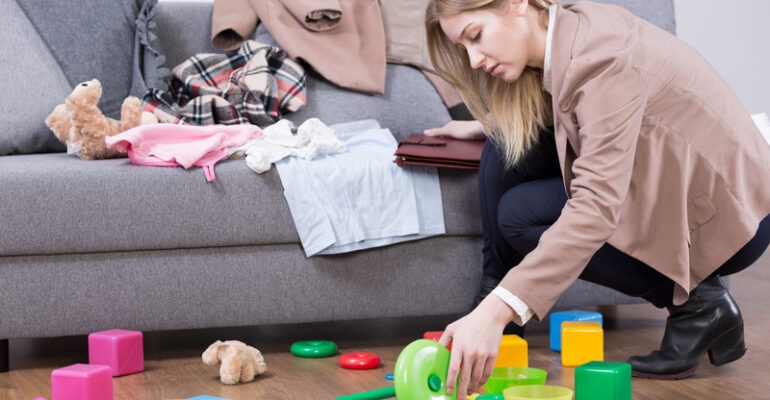Quality time with our children – 4 tips for the busy professional parent
Melissa, a newly hired medical director, is in charge of supervising 3 clinicians, providing direct care to her own caseload, and managing the productivity reports of all the clinic staff. Melissa is happily married and also the mother of 2 young children, ages 2 and 4 years. She is fully satisfied with her childcare arrangements during the day, comforted that her children are safe and well taken care of. But scheduling childcare is not without its challenges. Many times, however, the day care program is closed and the babysitter will often cancel, due to illness. When this happens, Melissa has the responsibility for organizing her children’s care, even during work hours. She often wonders what it will mean to manage multiple responsibilities at the clinic, should there be a sudden need to “drop everything to care for her son, with a fever spike” or if several hours are needed to find backup childcare on short notice. Daily, Melissa thinks about these possible scenarios, especially since her clinicians and superiors rely upon her so much at work. And, in the event of an urgent request or a clinical crisis, she must also be ready and able to complete her tasks.
For the working parent, balancing quality time with family against the demands of professional life can be an ongoing challenge. Professional life may expand outside of work duties to include academic or advocacy pursuits and special projects. And family life may expand outside of the home to include involvement in the local school, community organizations, and religious institutions. Identifying ways to optimize the time spent with family, particularly children, is beneficial.
When Melissa gets home in the evening and starts preparing the children for dinner and their bedtime routine, she often wonders how much quality time they will have together. Also, will she have enough energy to match theirs, and how likely is she to achieve all those amazing motherly goals that she long dreams of—nurturing, teaching values, establishing discipline and instilling self worth.
The evening routine, in addition to taking care of the family, is nothing short of busy. Add healthy, active play to the mix and Melissa has to muster the strength to push past feeling exhausted from work. This is easy, because she is genuinely overjoyed to see them, especially after a long day. But, give it a few minutes and the high energy, not easily calmed, giddy with excitement that says, “We are just happy to see you,” makes Melissa feel like she is about to start that second shift.
Despite the hustle and bustle of daily life, the professional parent must make space in their mental and physical world for their children. However, we may be drawn away from those quality moments with our children by the presence of personal electronic devices, like smart phones with their many interruptions and distracting ringtones, or even the untouched magazines we enjoy reading, or other attention-consuming tasks.
For some, the available time slots are limited to an hour in the morning and a few hours in the evenings. On weekends, time can feel abundant, though, in reality, other planned activities encroach upon quality time for our children.
According to experts in childhood development, childhood free play is an essential aspect of development, but due to a host of factors, it has become less and less part of the childhood experience in many of the current daily routines.
Here are four (4) tips for spending quality time with your child:
1. Recognize the value in your child spending quality time with you.
It is not necessary to plan a complex outing or spend a lot of money, but just being in your attentive presence serves the emotional and developmental needs of the child. Be curious; make eye contact at their level by stooping or sitting and talking with your child.
2. Try to share and include your children in your child-friendly interests.
First, reflect on activities that are important to you and then share these activities with your child. If you enjoy listening to music or you like dancing, then play child friendly music and dance with your child, during your time together. They will love to mimic your movements or show off their own. If you enjoy art, spend time coloring or painting with your children on a regular basis. Share with your children the foods you enjoy. Allow them to experiment with various shapes, textures, and color foods. If you enjoy and value praying, then pray with them. If you like the outdoors, take them to the park or on the lawn to observe, read, and paint. If you enjoy traveling, consider getting the “Little Passports,” to introduce your child to the world through interactive activities. The idea is to continue doing something you already enjoy doing and include your child in the process. Include them in all those special moments.
3. Get down on the floor and play!
Almost nothing parents can give will surpass the benefits of playing with their child and engaging in their mental world. Children in the toddler years naturally engage in creative play, as they process and learn more about their world. Engaging in child directed play would be a quick and easy way for Melissa to spend quality time with her young children. As a parent, you can be very effective by just narrating what your child is doing and asking what he or she wants you to do next! Don’t takeover; instead, just follow along. Make sure there are enough toys they can use to explore.
4. Aim to be fully present, mentally.
For at least 15 minutes each day, allow for full emersion with no distractions. Allow for full awareness of the experience. The time will feel like an eternity and your child will have extreme joy in knowing they have your full attention. That means you must prepare and place your smart phone out of reach for 15 minutes, stop talking to the other adults in the room during that time, and when distracted by memories or worries from the day, redirect your attention to the full emersion between you and your child on an activity, a conversation, or a game.
These four (4) tips are grounded in contemporary data on child development. The busy professional parent, armed with these tips, will be better prepared to provide their children with essential parental influence, no matter how many other caregivers are involved in the child’s life. Parents, like Melissa, can remind themselves that while they may not be perfectly available, their efforts to make the most of the quality time with their children, their “good enough” parenting will contribute to their child’s healthy development.
References:
1. Discipline. AACAP Facts for Families, American Academy of Child and Adolescent Psychiatristy. #43 September 2008. Accessed on 10/9/17.
2. Ginsburg KR, American Academy of Pediatrics Committee on C, American Academy of Pediatrics Committee on Psychosocial Aspects of C, Family H. The importance of play in promoting healthy child development and maintaining strong parent-child bonds. Pediatrics. 2007;119(1):182-91.
3. Miller-Lewis LR, Searle AK, Sawyer MG, Baghurst PA, Hedley D. Resource factors for mental health resilience in early childhood: An analysis with multiple methodologies. Child Adolesc Psychiatry Ment Health. 2013;7(1):6.
4. Moore KA, Kinghorn A, Bandy T. Parental Relationship Quality and Child Outcomes Across Subgroups. Child Trends: Research Brief. 2011; #2011-13.





